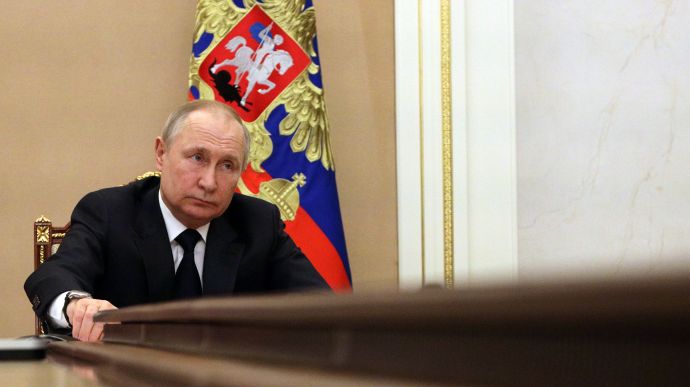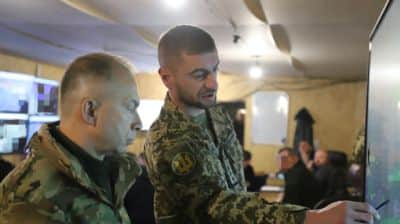Putin tries to "buy" loyalty of security forces to retain power – NYT

Valdimir Putin, President of Russia, is trying to win the loyalty of security forces in order to hold onto power.
Source: The New York Times
Details: NYT recalls that in order to retain power after the rebellion, Putin allowed the Wagner mercenaries and Evgeny Prigozhin, their leader, to "go to Belarus" and showered Russian security forces members with praise and remarked the "decisiveness and courage" of the Russian troops.
Moreover, in order to demonstrate his "closeness to people" during the crisis, Putin shook hands with his admirers and even kissed a young woman on the forehead for the first time in several years.
There is no evidence that those involved in the rebellion or associates of Prigozhin have been arrested. It is a marked contrast to the aftermath of the 2016 coup attempt in Turkey, when President Recep Tayyip Erdogan emptied his country’s prisons to make room for more than 40,000 detainees.
Speculation has swirled over the fate of Gen. Sergei Surovikin, a senior military official close to the mercenary chief. While some reports said he might have been detained or arrested, several close observers of Putin’s system predicted that if the general had been held for questioning, he would soon be let go.
"Arresting generals "would throw the army into disarray," source of NYT, who has known Putin for decades, said. He chose to remain anonymous, fearing the consequences he may face for discussing sensitive matters.
Quote from NYT: "The apparent caution was yet another indication that Mr. Putin, despite the striking anger he showed over what he called Mr. Prigozhin’s "betrayal," is reaching for a familiar toolbox to maintain power."
More details: Mainly, Putin is raising salaries of soldiers and members of law enforcement. He has also promised to provide more weaponry for one of the most devoted leaders of one of the Russian security services – Viktor Zolotov, head of the National Guard of Russia.
At the same time, supplying the military and security services with more money and power carries certain risks. Some experts suppose that other groupings in these structures may "be tempted" to carry out another rebellion, following Prigozhin’s example.
The analysts also assume that Putin’s new "accent" on an increased loyalty of the security forces may affect Russia’s efficacy in the battlefield: ""If you keep the principle of loyalty as more important than effectiveness, then there won’t be the risks that were associated with the mutiny. But there won’t be any hope for a more effective functioning of the system, either."
Background:
- On the evening of 23 June, Wagner Group leader Yevgeny Prigozhin claimed that the regular Russian army had launched a missile strike on the Wagner mercenaries’ rear camps. He therefore deployed 25,000 of his mercenaries "to restore justice".
- Prigozhin claimed that his forces had taken control of military facilities in Rostov-on-Don, including the air base, and were heading "to Moscow", and that his soldiers had shot down at least three Russian helicopters. Wagner mercenaries also seized military facilities in the Russian city of Voronezh.
- In an emergency address on 24 June, Russian President Vladimir Putin said that Russia was "fighting for survival" and that attempts were being made to "organise a rebellion" in the country.
- On the afternoon of 24 June, Russian media reported that the Office of the President of the Russian Federation anticipated that Yevgeny Prigozhin’s Wagner Group fighters would likely reach Moscow’s outskirts in the next few hours, with fighting expected near Russia’s capital. Ukrainian intelligence had information that Putin had urgently left Moscow for his residence in Valdai. The Wagner Group convoy was spotted 400 km from Moscow.
- On Saturday evening, following a conversation with self-proclaimed Belarusian President Alexander Lukashenko, Prigozhin announced that his mercenaries were turning their convoys around and going back to set up field camps. Later, it was reported that the criminal case against Prigozhin was to be closed and he would "go to Belarus".
- Russian pro-war media and Telegram channels are claiming that 13 to 20 people died as a result of the mutiny by Wagner Group fighters. In addition to this, 19 houses and roads have been damaged as a result of the march of Prigozhin’s troops.
- The Russian army has also suffered losses in military equipment: according to the Vazhnie Istorii (Important Stories) media outlet, the Wagner PMC has shot down three radioelectronic warfare Mi-8 helicopters, one transport Mi-8 helicopter and two combat helicopters Ka-52 and Mi-35M, as well as an aircraft-control point Il-22M and two armoured vehicles KamAZ and Tigr. The Wagner PMC have lost two UAZ, one KamAZ and Ural armoured vehicles.
- Herewith, as reported by the Russian service of Radio Liberty wth reference to the estimates by the Dutch project Oryx, the Wagnerites had shot down an Il-22M aircraft and six helicopters of the Russian army during the mutiny.
- Putin recognised the death of Russian pilots during the rebellion of the mercenaries of the Wagner Group but made no big statements about it. He only gathered the heads of law enforcement agencies at the meeting but there, he merely thanked them for "suppressing" the rebellion of Wagner Group mercenaries. Putin also thanked Wagnerites themselves – allegedly for "not resorting to fratricidal bloodshed".
Journalists fight on their own frontline. Support Ukrainska Pravda or become our patron!





